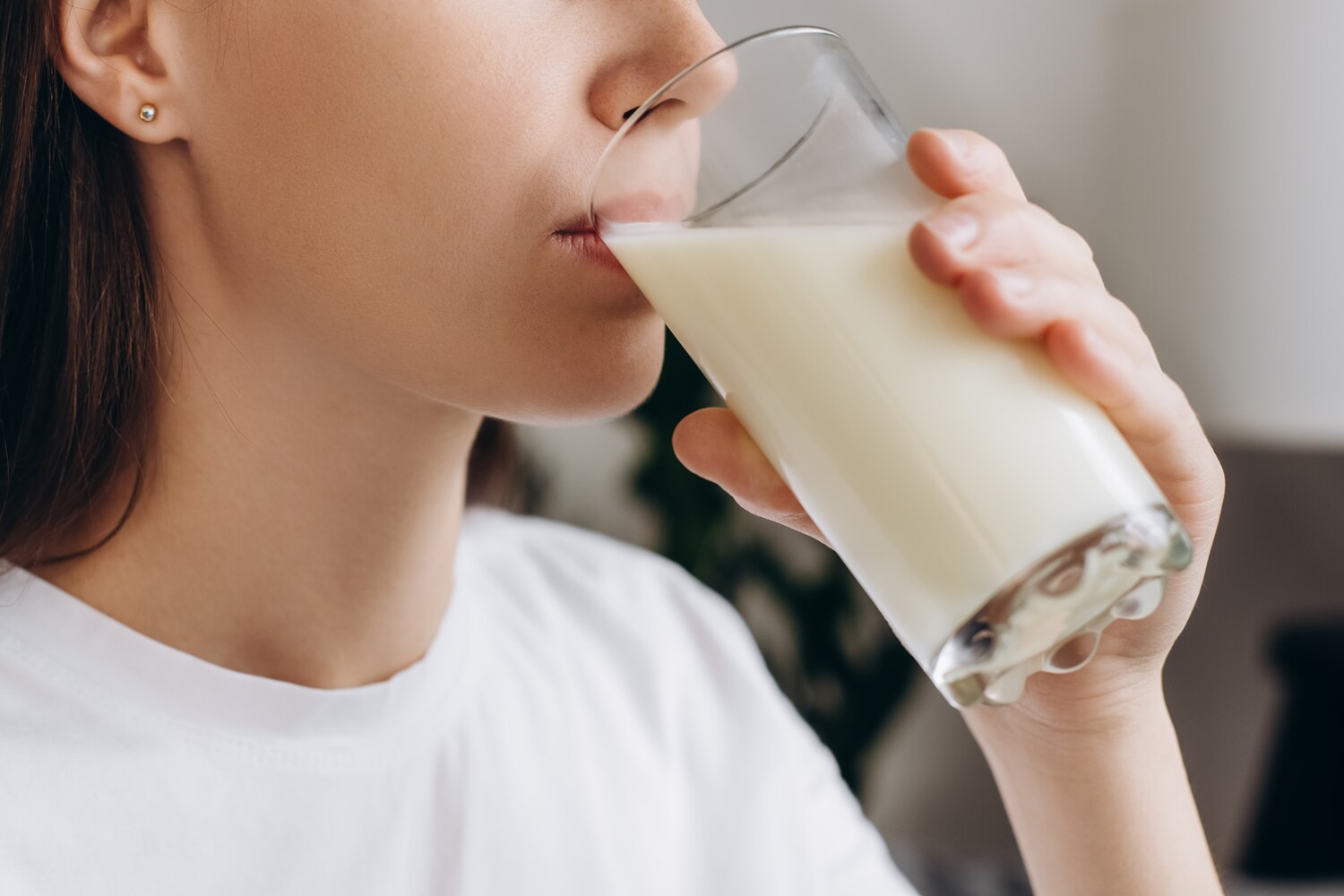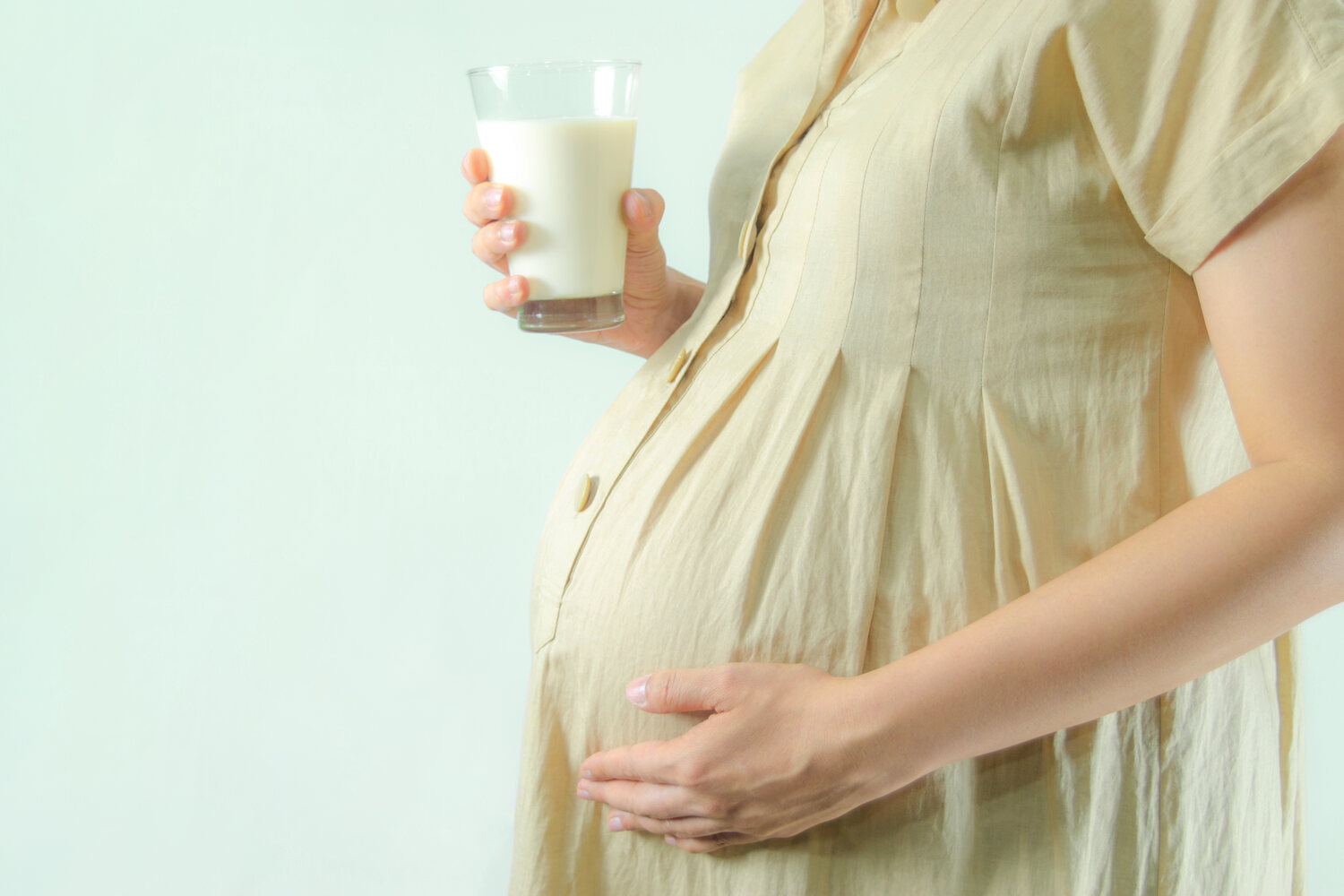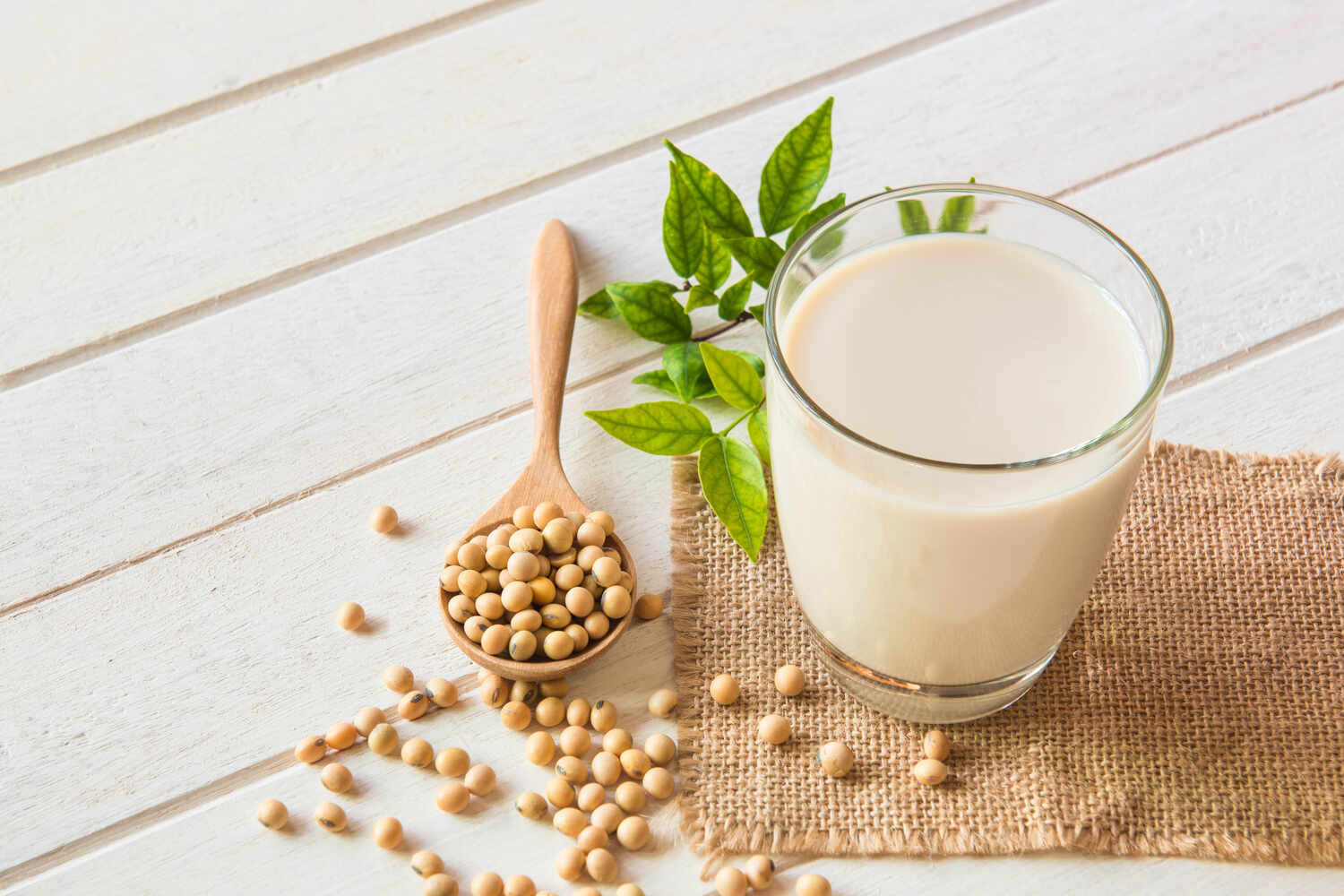
If you are pregnant, you must review your diet closely to see if you need to add or replace any of the food items to make sure your pregnancy and the baby growing inside stay healthy. When it comes to choosing milk for the development of your fetus, you will come across plenty of options. One food item that has always had contradictory views is soy milk. How safe is soy milk during pregnancy?
Soy milk contains the same level of protein as cow’s milk. While milk is a good source of calcium and protein and essential during pregnancy, some women cannot have dairy products as they are lactose intolerant, and they usually switch to soy milk. There is scientific research that talks about all the health benefits of soy milk, while at the same time, other research points towards the negative effects of soy milk. If you are wondering if soy milk is safe to consume during pregnancy, then read on.
In This Article
- What is Soy Milk?
- Is Soy Milk Safe During Pregnancy?
- Nutritional Value of Soy Milk
- Amazing Top 7 Benefits of Soy Milk During Pregnancy
- Side Effects of Soy Milk During Pregnancy
- What is the Recommended Amount of Soy Milk for a Pregnant Woman?
- FAQ’s
What is Soy Milk?
Made from either whole soybeans or soy protein isolate, soy milk is a plant-based substitute for cow’s milk. For those who can’t digest lactose, have an allergy to cow’s milk, or are vegetarian or vegan, this soy milk is an excellent choice. To make soy milk nutritionally equivalent to cow’s milk, it is typically fortified with minerals and vitamins, including calcium and vitamin D, in addition to its protein and vitamin content.
To make soy milk, the soybeans are soaked, ground, and then boiled. Following that, the liquid is separated from the solids (straining) to produce soy milk. For some, soy milk is just a tasty drink; for others, it’s a versatile milk alternative that works well in coffee, cereal, smoothies, and all sorts of baked goods and foods. On top of that, there are flavored and sweetened soy milk options to satisfy everyone’s cravings.
Is Soy Milk Safe During Pregnancy?

It is generally considered safe to consume soy milk while pregnant. However, it is important to note that consuming excessive amounts of soy milk can lead to problems. Therefore, it is recommended to practice moderation when drinking soy milk during pregnancy. Furthermore, make sure to incorporate it into a nutritionally balanced diet.
Soy milk has many excellent benefits during pregnancy. It is rich in proteins, minerals, essential amino acids all of which promote a healthy pregnancy and healthy fetal growth.
Nutritional Value of Soy Milk
Soy milk is a nutrient-rich plant-based beverage, providing a good source of protein, essential amino acids, and various vitamins and minerals, including vitamin D and calcium. 100 gm of soy milk contains (1)
| Nutrients | Value |
| Water | 92.4 g |
| Energy | 38 kcal |
| Protein | 3.55 g |
| Fat | 2.12 g |
| Carbohydrate | 1.29 g |
| Fiber | 0.45 gm |
| Calcium | 101 mg |
| Iron | 0.54 mg |
| Magnesium | 0.208 mg |
| Phosphorous | 69 mg |
| Potassium | 158 mg |
| Sodium | 34 mg |
| Zinc | 0.31 mg |
| Copper | 0.108 mg |
| Manganese | 0.208 mg |
| Selenium | 1.9 µg |
| Folate | 20 µg |
| Vitamin D | 27.2 IU |
Amazing Top 7 Benefits of Soy Milk During Pregnancy

Soy milk is derived from soybeans. Dry soybeans are soaked in water and then ground to obtain soy milk. It is available in different variants, like fat-free, whole, flavored, and fiber- or calcium-enriched.
Here are 10 potential benefits of consuming soy milk during pregnancy:
1. Provide Protein For Fetal Development
Soy milk is a rich source of plant-based protein, providing essential amino acids necessary for the growth and development of the fetus. Soy milk contains all nine vital amino acids. Including more protein in your diet is key during pregnancy, especially if you are a vegetarian. Additionally, it is also a “low-fat” source of protein, unlike meat products that are high in fat.
Ensuring the normal growth, development, and survival of the embryo depends on the regulation of the mother’s dietary protein intake throughout pregnancy. Proper protein consumption during pregnancy may enhance the success of reproduction and lead to better health for both mother and fetus (2).
[Read : Protein During Pregnancy]
2. Helps To Prevent NTDs
Most pregnant women are asked to take folic acid supplements during pregnancy. Folic acid is known to aid the development of the nervous system in the unborn baby. Neural tube defects (NTDs) are complicated congenital malformations that occur when the neural tube fails to close properly during embryogenesis. It is one of the most common birth defects. It has been established that supplementing with folic acid reduces the occurrence of neural tube defects (NTDs) (3). Soy milk is a natural source of folic acid.
3. Contributes to Calcium Intake and Bone Health
Calcium, the most abundant mineral in the body, plays a crucial role in various mechanisms and reactions. It is essential for functions like muscle contraction, bone formation, and the proper functioning of enzymes and hormones (4a). A newborn baby’s skeleton typically contains around 20–30 g of calcium (4b).
Pregnant women who consistently consume low amounts of calcium, specifically less than 500 mg per day, may face a higher risk of increased bone loss. If the diet does not supply sufficient calcium, the body will extract it from the bones (4c). Supplementing calcium during pregnancy helps prevent preeclampsia and preterm births while also improving the bone health of both the mother and the infant (4d). Soy milk contains calcium and drinking soy milk will contribute to the calcium intake during pregnancy.
4. Provides Benefits of Potassium
Soy milk is a good source of potassium. During pregnancy, the blood volume increases by 50%. A slight amount of additional electrolyte (comprising sodium, potassium, and chloride) is required to maintain the correct chemical equilibrium of the increased blood volume. A pregnant woman should aim to consume approximately 2900 mg of potassium per day (5).
An insufficient amount of potassium intake can lead to hypokalemia, which is characterized by low levels of potassium in the body. Diets that are rich in fiber and potassium seem to be linked to a decreased likelihood of developing hypertension and preeclampsia (6). Soy milk contains both fiber and potassium.
5. Good Source of Selenium
Deficits in selenium may harm the fetus’s immunological and neurological systems, cause miscarriages, and cause problems throughout pregnancy. It has been shown that low blood serum selenium concentrations during the early stages of pregnancy are associated with low-birth-weight babies (7).
Studies found that Se supplementation during pregnancy reduced PE/PIH, GDM, IUGR, PROM, postpartum depression, and thyroid dysfunction. Fetal lipid profile, fetal bilirubin, and breast milk composition are all positively influenced by Se supplementation (8). Soy milk is a good source of selenium.
6. Provide the Benefits of Magnesium
Optimum intake of magnesium is essential for the management of undesired pregnancy complications, the prevention of low birth weight, and preeclampsia (9). Magnesium deficiency, which may occur in pregnant women, causes significant alterations in fetal development and increases the risk of premature labor (10). Soy milk is blessed with this vital nutrient.
7. Helps to Boost Immunity
Soy milk contains certain nutrients that may contribute to overall immune system function. Soy contains compounds with antioxidant properties, such as phytochemicals and isoflavones (11). It also contains selenium. Just like regular cow’s milk, fortified soy milk has adequate levels of vitamin A, vitamin D, and calcium (12). It also contains traces of iron, zinc, and beta-carotene. All these nutrients help boost immunity (13).
Side Effects of Soy Milk During Pregnancy

Soy milk is rich in nutrients that support a healthy pregnancy and promote fetal development. However, it is crucial to take into account the potential impacts of soy products, such as soy milk, during pregnancy.
Following are some of the problems associated with soy milk, especially during pregnancy.
1. Phytic Acids
Soy milk contains phytic acids. Phytic acid reduces the absorption of some harmful heavy metals, such as mercury and lead, in the body. This is awesome. But as a consequence, phytic acid also blocks the uptake of essential minerals such as calcium, magnesium, iron, and zinc (14), all of which are extremely important during pregnancy. Lectins in soybeans can interfere with the absorption of calcium, iron, phosphorus, and zinc (15).
[Read : Calcium During Pregnancy]
2. Isoflavones
Soy milk contains isoflavones, which can imitate estrogen in the human body (phytoestrogens) (16). Consuming so much of it can impact not just your health but also your baby’s development inside the womb. Some studies suggest that high levels of phytoestrogens might have estrogenic effects and could potentially affect hormonal balance. However, the evidence on the impact of moderate soy consumption during pregnancy is not conclusive.
3. Allergies
While cow’s milk allergy is relatively common, soy allergy is also possible. For pregnant women with soy allergies, it’s essential to avoid soy products during pregnancy. Symptoms of soy allergy may include itching, hives, swelling, abdominal pain, diarrhea, and, in severe cases, anaphylaxis (17).
4. Interfere Iodine Absorption
Excessive soy consumption may interfere with iodine absorption. Iodine is crucial for thyroid function, and thyroid hormones are important during pregnancy for the development of the baby’s brain and nervous system. If soy products are a significant part of the diet, it’s advisable to ensure adequate iodine intake through other sources.
5. May Cause Digestive Issues
Soy milk, similar to other soy products, contains oligosaccharides that may lead to gas and bloating for certain individuals. It is important to consider that pregnant women may already be susceptible to gastrointestinal discomfort
What is the Recommended Amount of Soy Milk for a Pregnant Woman?

There are so many benefits. And so many side effects. What should you do? It is not surprising to get confused. Moderation is the key. Having one or two servings of soy milk per day is perfect. It will give you all the benefits of soy milk while limiting the probability of side effects.
Note*: One serving, for reference, is equal to one glass. So, you can have up to two glasses of soy milk per day without worrying about the consequences.
If you are still unsure, please talk to your doctor and ensure that you are not allergic and that it is safe to have soy milk. If you want to be safe and not take risks, it might even be a good idea to avoid soy milk altogether and replace it with other high-protein sources and a balanced diet.
Pregnancy is a time when you need to be very careful about what you eat. While many foods will help ensure a healthy pregnancy, many others can result in unwanted side effects.
Pregnancy is the most beautiful phase of a woman’s life, so relax, stay calm, and enjoy this phase with little precautions here and there. This will help you stay healthy, make your delivery easier, and, at the same time, help your unborn baby grow healthy.
[Read: 8 Indian Foods To Avoid During Pregnancy]
FAQ’s
1. Is Soy Milk a Healthy Drink When Pregnant?
Soy milk can be a healthy drink during pregnancy, as it is a good source of protein, calcium, and other essential nutrients. However, it’s important to choose soy milk that is fortified with vitamins and minerals, particularly calcium and vitamin D, which are crucial for fetal development.
2. Can I Add Soy Milk to My Cereal and Other Foods When Pregnant?
You can add soy milk to your cereal and other foods during pregnancy. It can be a nutritious alternative to dairy milk, providing essential nutrients. Ensure that the soy milk is fortified with important pregnancy nutrients like calcium and vitamin D.
3. Can Soy Milk Control My Cholesterol Levels When Pregnant?
Soy milk, being plant-based and containing phytoestrogens, may help in managing cholesterol levels during pregnancy. These compounds could potentially have effects that could lower cholesterol levels. However, it is important to note that individual responses can vary.
4. Can Drinking Soy Milk During Pregnancy Affect My Baby?
Though not scientifically backed, people do believe it can. Soy milk is rich in isoflavones, which can cause tumors in babies. It can result in some birth defects if consumed in large quantities.
Reference
- Soymilk, original and vanilla, unfortified – [https://fdc.nal.usda.gov/food-details/1999630/nutrients]
- Impacts of maternal dietary protein intake on fetal survival, growth, and development – [https://www.ncbi.nlm.nih.gov/pmc/articles/PMC5882021/]
- Neural Tube Defects, Folic Acid and Methylation – [https://www.ncbi.nlm.nih.gov/pmc/articles/PMC3799525/]
- Calcium: A Nutrient in Pregnancy – [https://www.ncbi.nlm.nih.gov/pmc/articles/PMC5561751/]
- Potassium – [https://ods.od.nih.gov/factsheets/Potassium-Consumer/]
- Plant-Based and Plant-Rich Diet Patterns during Gestation: Beneficial Effects and Possible Shortcomings – [https://www.ncbi.nlm.nih.gov/pmc/articles/PMC4561836/]
- The role of selenium in human conception and pregnancy – [https://www.sciencedirect.com/science/article/abs/pii/S0946672X14001345]
- Selenium Supplementation in Pregnancy-Maternal and Newborn Outcomes – [https://www.ncbi.nlm.nih.gov/pmc/articles/PMC9095401/]
- Effect of Magnesium Supplement on Pregnancy Outcomes: A Randomized Control Trial – [https://www.ncbi.nlm.nih.gov/pmc/articles/PMC5590399/]
- The Role of Magnesium in Pregnancy and in Fetal Programming of Adult Diseases – [https://www.ncbi.nlm.nih.gov/pmc/articles/PMC8360883/]
- Soy isoflavone: The multipurpose phytochemical (Review) – [https://pubmed.ncbi.nlm.nih.gov/24649012/]
- What food group is soy milk (soy beverage) in? What about tofu, tempeh, and other soy products? – [https://ask.usda.gov/s/article/What-food-group-is-soymilk-soy-beverage-in-What-about-tofu-tempeh-and-other-soy-products]
- Exploring the Immune-Boosting Functions of Vitamins and Minerals as Nutritional Food Bioactive Compounds: A Comprehensive Review – [https://www.ncbi.nlm.nih.gov/pmc/articles/PMC8779769/]
- Calcium – [https://www.hsph.harvard.edu/nutritionsource/calcium/]
- Are Anti-Nutrients Harmful? – [https://www.hsph.harvard.edu/nutritionsource/anti-nutrients/]
- Straight Talk About Soy – [https://www.hsph.harvard.edu/nutritionsource/soy/]
- Soy Allergy – [https://www.ucsfhealth.org/education/soy-allergy]
Read Also: Almond Milk During Pregnancy – Is It Safe ?

